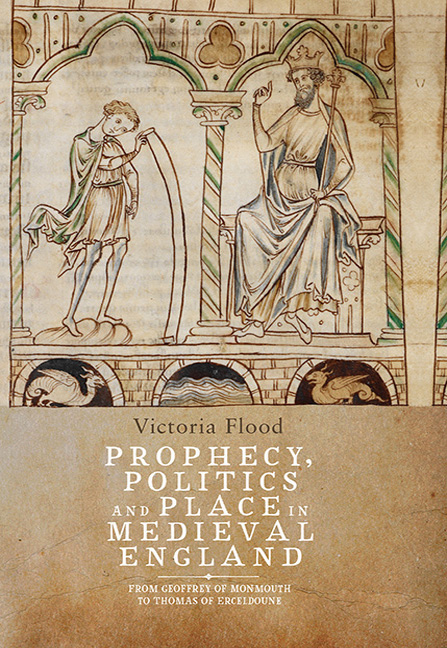Book contents
- Frontmatter
- Dedication
- Contents
- List of Illustrations
- Acknowledgements
- Abbreviations
- Introduction: An Island of the Ocean
- 1 ‘Cadualadrus Conanum uocabit’: Political Prophecy in England, the Welsh March, and Ireland, c. 1130s–1260s
- 2 ‘E si finerount les heirs d'engleterre hors de heritage’: Galfridian Prophecy and the Anglo-Scottish Border, c. 1301–30s
- 3 ‘Whan shal this be?’ The English Erceldoune Tradition, c. 1310s–90s
- 4 ‘A dede man shall make bytwene hem acorde’: Cock in the North and Ceiliog y North, c. 1405–85
- Conclusion
- Bibliography
- Index
Introduction: An Island of the Ocean
Published online by Cambridge University Press: 09 May 2017
- Frontmatter
- Dedication
- Contents
- List of Illustrations
- Acknowledgements
- Abbreviations
- Introduction: An Island of the Ocean
- 1 ‘Cadualadrus Conanum uocabit’: Political Prophecy in England, the Welsh March, and Ireland, c. 1130s–1260s
- 2 ‘E si finerount les heirs d'engleterre hors de heritage’: Galfridian Prophecy and the Anglo-Scottish Border, c. 1301–30s
- 3 ‘Whan shal this be?’ The English Erceldoune Tradition, c. 1310s–90s
- 4 ‘A dede man shall make bytwene hem acorde’: Cock in the North and Ceiliog y North, c. 1405–85
- Conclusion
- Bibliography
- Index
Summary
This book explores the relationship between prophecy, politics, and place in medieval imaginings of Britain. It charts a dominant textual tradition of political prophecy concerned with pan-insular sovereignty that developed in England over the course of three hundred years, alongside Welsh and Scottish prophetic counter-traditions rooted in alternative pan-insular fantasies. Prophecy has erroneously long been understood to be one facet of the superstition and credulity that for many modern commentators signifies the great divide between medieval and modern mentalities. This is in large part due to the long-enduring influence of Keith Thomas's 1971 Religion and the Decline of Magic, a study of the movement from medieval supernaturalism to Enlightenment rationalism, which dedicates fifty (out of its 850) pages to prophecy, in a sequence of chapters also concerned with fairies, ghosts, and witch-beliefs. Yet the central belief that imbues political prophetic texts of the insular Middle Ages is not in the marvellous nature of the prophet Merlin and his later counterparts, but rather in territorial entitlement, its historical ratification, and the role of peoples and places in the realisation of a particular vision of the future. It is the same category of belief that has motivated colonialists, nationalists, and separatists alike for centuries, and it is one we have not yet outgrown: the perceived rights of peoples to territories.
The present is certainly an opportune moment for reflection on the geo-political visions of insular history: nearly twenty years after Welsh and Scottish devolution, the relationship between national borders and political identities in modern Britain remains a contested issue, and the current configuration of insular political sovereignty is again open to challenge. This is a literary history with no small claim to contemporary relevance.
A term first coined by Rupert Taylor in his 1911 study The Political Prophecy in England, political prophecy refers to a predominately secular literary tradition drawing on authorities from the historical and legendary past, alongside a common stock of heroes and ciphers, to comment on near-historical and contemporary political affairs. Although for nearly a century following the publication of Taylor's book there was relatively little advancement in the field, in the last decade and a half awareness of the importance of prophecy in the reconstruction of insular political and intellectual culture in the medieval and early modern periods has gained considerable ground.
- Type
- Chapter
- Information
- Prophecy, Politics and Place in Medieval EnglandFrom Geoffrey of Monmouth to Thomas of Erceldoune, pp. 1 - 17Publisher: Boydell & BrewerPrint publication year: 2016

